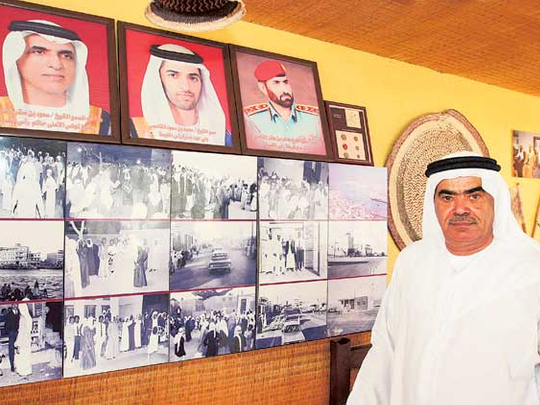
Ras Al Khaimah: Growing up in a time before the federation was formed – where electricity or technology was not yet the standard – has enabled the older generation to not take the country’s achievements for granted and to appreciate all of its vast accomplishments in such a short time span.
Living in Ras Al Khaimah in the mid-1900s was no easy task by today’s standards, but for many like Mohammad Jasem Al Muzakki, 58, the simple way of life was the only option.
“In the 1950s, there were no primary schools here, so all the children would go to Sharjah. But some of the wealthier parents who could afford to, would send their children to Kuwait,” said Al Muzakki.
After completing his bachelor’s degree in commerce at the University of Cairo, Al Muzakki worked his way up at the Ministry of Economy for 40 years, until he reached the post of undersecretary.
Having retired about two years ago, he now dedicates his time to running his own business and is chairman of the Arab Company for Livestock Development. Looking back, he proudly points out that once the federation was formed on December 2, 1971, the country started to rapidly witness vast improvements – mainly with the launch of educational institutions and hospitals.
“It was not uncommon to find many of the children studying in madrassas (religious educational institutes), where an Islamic scholar would teach them to read the Quran. When the children learnt it all, they would stand outside people’s houses and recite it and, in exchange, would receive a quarter of a rupee or sometimes half,” he fondly remembered.
“We have moved very far as a nation from not having electricity in the house to building one of the biggest solar parks in the region. When I was a child, everybody would go straight to bed after Isha prayer but children nowadays are very lucky and privileged to have such comforts like Nintendos and shopping malls,” he said.
“When I was sick, there were no hospitals so my family would use the old traditional medicine in where the head of the nail would be burnt and then pressed on to the skin on the area that hurt us. You can still see the marks on some people’s heads and stomachs,” he said.
Herbs were used instead of medicine and pills you buy these days at pharmacies, and he explained that old people have a difficult time coping with the nation’s development and still prefer the traditional ways.
Al Muzakki further emphasised his pride on how strong the country has become over the last 42 years, and has made its mark in international affairs as well as playing an important role in the United Nations and making donations to the needy around the globe.
“Until now, we still keep our tradition of having a shaikh as our leader and believing that he is responsible in taking care of us and the people’s welfare. Words cannot describe my gratitude to our leaders and how proud I am that during my lifetime I have been able see the changes from past to present, and see the glorious ambitions it has for the future.”












